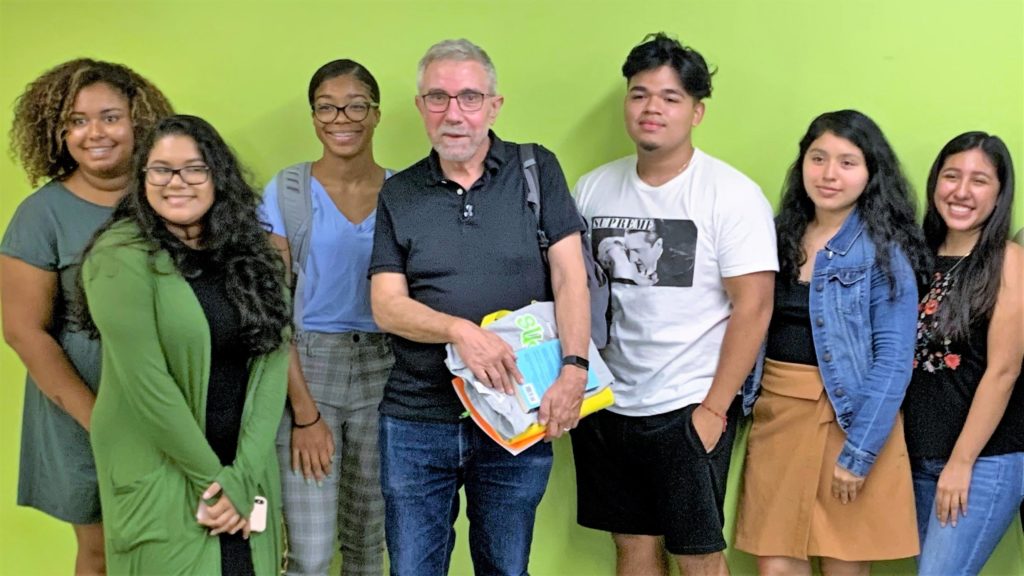
Paul Krugman is not your typical economist. Ask him which books have influenced him the most, and he doesn’t name-drop John Maynard Keynes or Adam Smith. Instead he talks about James Baldwin and Isaac Asimov.
“I was a middle-class kid from Long Island,” he said on a recent visit to some of our programs. “Books were how I found out that not everyone was experiencing what I was from my sheltered suburban life.
“Books,” he added, “are how we sustain civilization.”
Krugman, our honoree at our Annual Gala on October 22nd, won the Nobel Prize for Economics in 2008 for his work on global trade. He is Distinguished Professor in Economics at City University of New York (CUNY) Graduate Center, a core faculty member at the Stone Center on Socio-Economic Inequality, and Luxembourg Income Study (LIS) Senior Scholar. But what most people know him for—what’s made him “the Mick Jagger of political/economic punditry,” according to the Asia Times—is his twice-weekly column in The New York Times, which covers topics from economics and health care to social policy and politics. His next book, Arguing with Zombies: Economics, Politics, and the Fight for a Better Future, is due out in January 2020.
Krugman first got to know Goddard Riverside through a colleague at the Times and was involved off and on for several years. Then, appropriately enough for a big reader, he agreed to serve as a judge for our Stephan Russo Book Prize for Social Justice when it debuted in 2017. (The prize is named after Goddard’s former executive director, who is himself a big reader.) Krugman remains on the judges’ panel today.
At our Options Center he sat in a circle with students, answering questions about his role as a journalist and listening to their concerns about college debt. At the TOP Clubhouse, he shook hands with participants and chatted with them in soft tones, focusing intently on their words.
TOP is a supportive space where people with a history of mental illness can build community and learn life and work skills. Because of social stigma, many people living with mental illness tend to isolate themselves. TOP helps its members break through that isolation and work toward having a supportive network and eventually, a job.
“TOP is more like a family than it is a program,” one member told him. “It makes me look forward to tomorrow,” said another. They seemed to make a big impression.
“What I just saw here was that someone took all the abstractions about what people in this situation need and turned them into real life,” Krugman said afterward. “It offers huge opportunities for the members.”
Options and TOP may seem like disparate programs, but what unites them is the thread running through all of Goddard’s programs: the goal of empowering people to rise from poverty and reach their full potential. That’s an issue Krugman has written sensitively about. “To be poor in America today, even more than in the past, is to be an outcast in your own country,” he wrote in 2008, adding that the failure to reduce poverty in this country “should provoke a lot of soul-searching.”
The challenge is real. Today, some 38 million Americans—especially Americans of color—are still living below the official poverty line more than 50 years after Lyndon Johnson launched his War on Poverty.
Goddard is committed to keeping up the fight. So it was gratifying to hear Krugman look around and say, after a day at our programs: “Visiting Goddard Riverside has been wildly encouraging. It makes me feel better about the future.”
***
Our Annual Gala on October 22nd will also feature the announcement of our third annual Social Justice Book Prize winner and a performance by our Young People’s Chorus! Get your tickets here: /Gala2019/